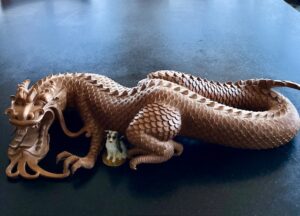Facing the Dragon

“What do you want to be when you grow up?” As a child, the question confused and annoyed me. What did grown ups want to hear? Should I tell them I want to stay up late, eat ice cream for supper, live on my own island. Should I admit that I don’t want to be a teacher, nurse or secretary—which seemed to be the only careers for women at that time.
I wanted to be a pirate. I wanted to invent things and make up stories and tell other people what to do. My answer was, “wise. When I grow up I want to be wise” (unlike people who asked children stupid questions).
I thought wisdom was something that came with experience. My grandmothers were wise. My Aunt Francis was wise. The lady in the Polish deli was wise. They’d seen a lot in their time, knew about Life and how to talk to children like they were people. I wasn’t experienced enough to be wise. I’d have to be patient and keep my eyes and ears open.
Early on, experience came from books. My parents read to me and once I learned how, I read everything (school books, grudgingly). There was no direction or censorship in my family; any sort of reading was acceptable. When I got older, I listened to music. Local radio stations played early rock ’n roll, but if you drove up the mountain in the evening, you could get Chicago on the car radio. They played a wider range of rock and blues. My head was filled with words—lines from books and poetry, words to songs; an abundance of human experience. Words, phrases and tunes swirled in my head and, alas, left me even more bewildered.
I became a regular in the town library. The folks I met there were smarter and wiser than me. Their knowledge was organized by theory and proof; ideas in categories, order, and proper syntax. The world made sense to them in ways that eluded me. Some scorned the books that I loved—fantasy, adventure, MAD magazine. Some had patience to answer my questions and address my dilemma. Was I worthy of their time? Their kindness? Would I ever understand the world?
I had plenty of friends that weren’t so well read or respected by grown ups; folks that only read comics or didn’t read at all. They were easier to understand and still, they were infinitely wiser than me. They made sense of the world in ways I couldn’t. They eliminated unnecessary complexities and played by their own rules, simple rules, more basic than those of teachers and parents. “Don’t rat on your friends.” “Say what you mean.” “If you make a promise, keep it.” They were not confused.
But I still was.
After years of reading, listening, watching and doing; I realize that the world may never make sense to me. I have learned friends. I have street-smart friends. I have friends who are completely unhinged by most standards. They’ve taught me plenty, but…
I’ll never be “wise” in the reputable sense of the word despite age and experience. My knowledge is spotty and instincts are not always error-free. But each error is a lesson—large, small, or neutral and the underlying themes of the lessons are: not to take myself too seriously, and to expect surprise. This is the nature of my “wisdom” thus far, a kind of Trickster “logic” that’s ragged and dirty, laughable, and occasionally terrifying. I’m not the the sage atop the hill but the awkward coyote that stumbles about in the scree between landslides and avalanches in the company of glorious flowers, trees, clouds, birds of every color and tune, creatures—real and…maybe not so real. Some uncertainty is necessary in order to gain experience and I’m often uncomfortable weighing risk. Most days I take a deep breath and press on. So far I’ve survived the dangerous animals, poisonous plants, and unpredictable pitfalls that I stumble through. Everything comes with a lesson. Sometimes I’m laughed at, sometimes I laugh with others, mostly I laugh at myself.
In a year of dragons, I’m still a dog—lazing in the shade, scuttling off at the rustle of promise.
Gong Hey Fat Choi